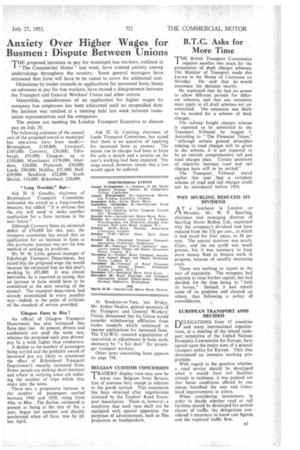B.T.C. Asks for More Time
Page 35

If you've noticed an error in this article please click here to report it so we can fix it.
THE British Transport Commission requires another two years for the preparation of draft charges schemes. The Minister of Transport made this known in the House of Commons on Monday. He said that he would announce his decision shortly.
• He explained that he had no power to allow different periods for different schemes, and that any extension must apply to all draft schemes not yet submitted. The extension was likely to be needed for a scheme of dock charges.
The railway freight charges scheme is expected to be submitted to the Transport Tribunal by August 5. According to "The Financial Times," "although certain general principles relating to road charges will be given in the scheme, it is not expected to be an entirely comprehensive rail and road charges plan. Certain questions of relativity between road and rail charges have still to be settled."
The Transport Tribunal stated earlier this year that a complete scheme of road and rail charges could not be introduced before 1954.
WEIY SPURLING REDUCED ITS DIVIDEND
AT a luncheon in London on Monday, Mr. W. F. Spurting, chairman and managing director of Sperling Motor Bodies, Ltd., explained why the company's dividend had been reduced from the 37i per cent., at which it had stood for four years, to 30 per cent. The annual turnover was nearly £24m., and the net profit was much greater, hut it was necessary to keep more money fluid to finance work in progress, because of steadily increasing costs.
There was nothing to report in the way of expansion. The company had sanction to raise further capital, but had decided, for the time being, to "hold its horses." Instead, it had rebuilt some of its premises and cleaned up others, thus following a policy of consolidation. ,
EUROPEAN TRANSPORT AIMS DECIDED
nELEGATIONS from 15 countries
and many international organizations, at a meeting of the inland transport committee of the United Nations Economic Commission for Europe, have agreed upon the major aims of a general transport policy for Europe. They also determined an intensive working programme.
With regard to the question whether a road service should be developed when it would rival rail facilities already in existence, it was pointed out that better conditions offered by one means benefited the user and stimulated improvements in others. When considering investments in order to decide whether road or rail facilities should be developed for certain classes of traffic, the delegations considered it necessary to know cost figures and the expected traffic flow.






























































































